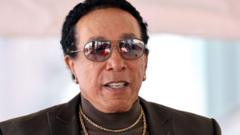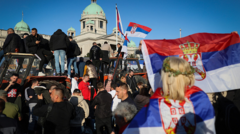A proposed Trump-branded hotel complex in Belgrade, Serbia faces significant delays as cultural preservationists challenge the government's decision to remove the site's protected status, leading to a criminal investigation.**
Controversy Erupts Over Trump Family Hotel Project in Serbia**

Controversy Erupts Over Trump Family Hotel Project in Serbia**
A hotel development led by Jared Kushner sparks legal and ethical challenges amid local preservation efforts.**
In recent months, a proposed Trump hotel complex in Belgrade, spearheaded by Jared Kushner, has ignited considerable backlash amid allegations of corruption and cultural insensitivity. Designed for the heart of Serbia's capital, this half-billion-dollar project has not only raised eyebrows but also prompted a full-fledged investigation into the Serbian government's dealings.
Twisting the fate of a site rich with historical significance — a building ravaged during the 1999 conflicts, symbolizing the Serbian people's memories of suffering — the Serbian authorities recently revoked its status as a protected cultural landmark. This contentious decision came just after Jared Kushner's father-in-law, Donald Trump, secured re-election. Critics, including prominent architects and cultural historians from Serbia's Republic Institute for the Protection of Cultural Monuments, immediately raised alarms. They contend that the government's maneuver breached established laws that safeguard cultural heritage.
Former deputy director of the institute, Estela Radonjic Zivkov, openly criticized the political motivations behind the government's approval. Facing pressure from local intelligence agents, she emphasized the political undertones driving this push for development that disregarded expert assessments. These preservationists are battling not only for the building's legacy but against a wave of apparent impropriety that seems to intertwine the Trump name with significant domestic policies in Serbia.
As the Trump family's foreign deals proliferate, this case stands alone as the only one drawing a criminal inquiry, making it a focal point in the broader discourse on the ethical ramifications of high-profile political families in real estate dealings abroad. This situation underscores growing tensions over issues of cultural preservation versus economic development in the context of international political relationships, with particular emphasis on how such undertakings may exploit vulnerable histories for personal gain.
Twisting the fate of a site rich with historical significance — a building ravaged during the 1999 conflicts, symbolizing the Serbian people's memories of suffering — the Serbian authorities recently revoked its status as a protected cultural landmark. This contentious decision came just after Jared Kushner's father-in-law, Donald Trump, secured re-election. Critics, including prominent architects and cultural historians from Serbia's Republic Institute for the Protection of Cultural Monuments, immediately raised alarms. They contend that the government's maneuver breached established laws that safeguard cultural heritage.
Former deputy director of the institute, Estela Radonjic Zivkov, openly criticized the political motivations behind the government's approval. Facing pressure from local intelligence agents, she emphasized the political undertones driving this push for development that disregarded expert assessments. These preservationists are battling not only for the building's legacy but against a wave of apparent impropriety that seems to intertwine the Trump name with significant domestic policies in Serbia.
As the Trump family's foreign deals proliferate, this case stands alone as the only one drawing a criminal inquiry, making it a focal point in the broader discourse on the ethical ramifications of high-profile political families in real estate dealings abroad. This situation underscores growing tensions over issues of cultural preservation versus economic development in the context of international political relationships, with particular emphasis on how such undertakings may exploit vulnerable histories for personal gain.


















